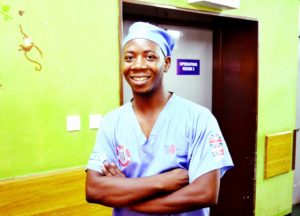Carol M. Mufana has worked with CHAI in Zambia since 2013, but it wasn’t until her own son’s life was saved by a doctor whose training was facilitated by CHAI that the work the organization was doing really hit home.
I met Dr. Vernon Pashi in June of 2017 when my one-year-old son underwent surgery for chronic and life-threatening digestion problems. Before the surgery, I was in distress and constantly worried, not knowing exactly what was wrong with him. His case was assigned to Dr. Pashi, who would later perform the surgery at the University Teaching Hospital under the watchful eyes of experienced consultant pediatric surgeons.
Dr. Pashi is a pediatric surgery student at the University of Zambia. His passion for helping children was first ignited while doing pediatric and surgical rounds at Kitwe Teaching Hospital in 2011. He was selected by the Ministry of Health as one of the specialists to be supported for training by the Swedish International Development Cooperation Agency (SIDA) through Clinton Health Access Initiative (CHAI) in 2015.

Dr. Vernon Pashi, 32, a fourth year Master of Medicine (MMed) – Pediatric Surgery trainee at the University of Zambia.
Having worked for CHAI since 2013, our mission of saving lives is very close to my heart. In most instances, it is difficult to know for sure how many lives we have touched, but my encounter with Dr. Pashi was different. It hit home and gave me an opportunity to experience the effects of our work first hand.
In Zambia, only 67 percent of the needed healthcare worker positions are currently filled. Even at third level hospitals, which are supposed to provide the highest level of care in the country, there are not enough specialists in critical fields. Zambia has set ambitious goals in its current National Health Strategic Plan: reduce the maternal mortality rate from 398/100,000 live births (ZDHS) to 100/100,000 live births and reduce the mortality rate for children under 5 from 75/1000 live births to 35/1000, both by 2021.
But this is only possible if the country has enough trained health workers.
To address these concerns, Zambia’s Ministry of Health approached SIDA in 2015 to provide financial assistance for specialized healthcare worker training for 2016 and 2017. SIDA agreed to provide the support, expanding on an existing collaboration between CHAI and the Ministry of Health to increase skilled birth attendants in rural areas of Zambia.
Health care workers such as Dr. Pashi, who played a major role in the promotion, care and treatment of mothers and children, were identified for specialized training. In addition to addressing the gap for specialized healthcare providers in the country, these trained professionals would ultimately:
- Reduce the number of cases referred to the next health system level of care;
- Help improve the quality of training at internship/ practicum sites and mentoring of junior staff at respective hospitals;
- Help reduce the costs incurred by the Ministry of Health and increase savings for other needy areas of the health sector by treating more patients in Zambia (rather than abroad)
- Increase the number of foreign patients seeking specialized care in Zambia, improving revenue for the Ministry of Health.
To date, SIDA has helped support the training of over 500 health workers, including those specialized in pediatric surgery, general surgery, obstetrics and gynecology, anesthesia, internal medicine, emergency medicine and care, nutrition, pediatric and child health, operating theatre nursing, critical care nursing and midwifery. Dr. Pashi is one of seven students currently receiving pediatric surgical training at the University of Zambia’s School Of Medicine (UNZA SoM).
After completing his training in June 2018, Dr. Pashi hopes to go back to Kitwe Teaching Hospital to set up a pediatric surgery unit and introduce laparoscopic minimal inversion surgery for children, which minimizes hospital stays and reduces recovery times.
While my son will need an additional surgery in the future, the surgery that Dr. Pashi performed certainly improved his quality of life significantly.
Seeing the critical role that Dr. Pashi played in treating my son’s illness has reinforced for me the importance of specialized health services and the need for these workers to pass on skills to future generations. It has also highlighted the important role of the Ministry of Health in having the right policies in place and working to implement them. Cooperating partners also have a role to play in supporting the ministry to implement policies aimed at improving the quality of health care.
While we have further to go, the passion, training and mentorship of healthcare workers like Dr. Pashi can help Zambia lead the way as an example to other countries to improve health systems and, ultimately, save lives.
*In his role as Ministry of Health Human Resource Director, before being promoted to Permanent Secretary – Administration, Mr. John Moyo worked closely with CHAI, to ensure that the specialist healthcare worker training proposal (addendum) was finalized and approved by SIDA. Mr. Moyo was very passionate about having more specialized health workers in Zambia.





